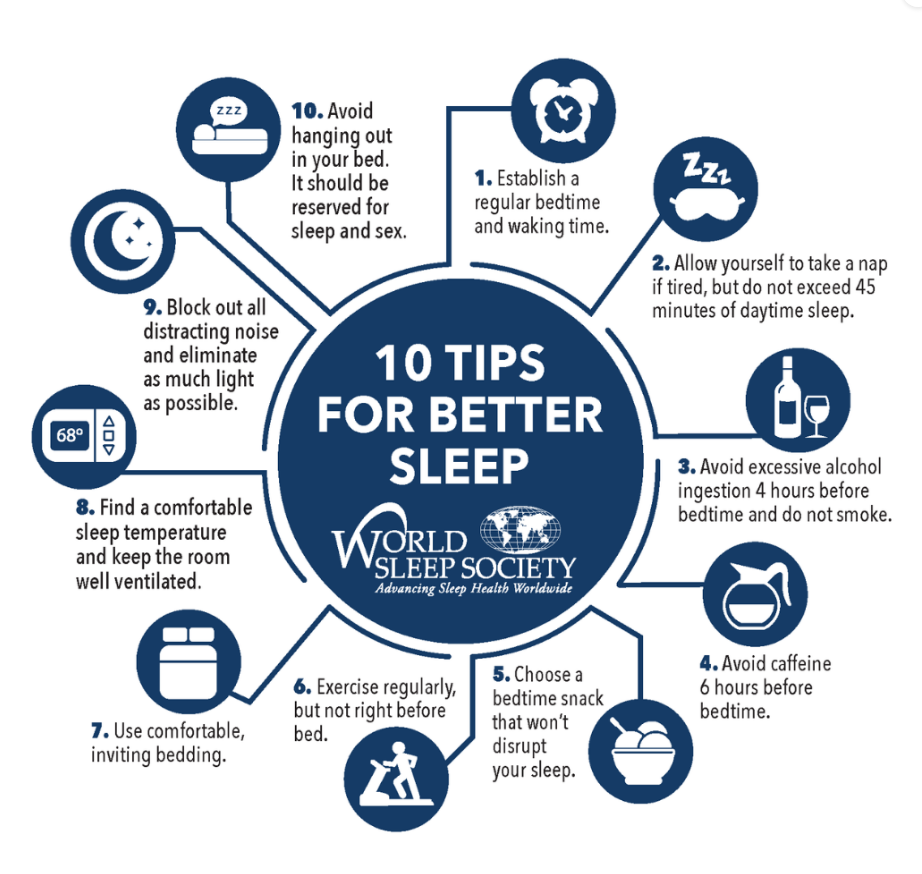
15 Mar Happy #WorldSleepDay
Happy #WorldSleepDay
The 2024 Theme: Sleep Equity for Global Health
Key messages
1. Sleep is essential to health: Sleep is a critical pillar of health, like nutrition and physical activity
- Support memory and learning
- Sleep supports brain health, and brain health supports sleep.
- Sleep supports immune health, and immune health supports sleep.
- Sleep helps the immune system to clear bacteria and viruses.
- Sleep helps to recycle old cells and maintain our bodies and energy levels
2. Sleep health is multidimensional
The six dimensions of sleep health are the following:
- Duration: how much did you sleep over 24 hours?
- Efficiency: how well do you fall asleep and stay asleep?
- Timing: when do you sleep?
- Regularity: do you have consistent sleep and wake times?
- Alertness: do you maintain good focus and attention during waking hours?
- Quality: do you feel satisfied with your sleep?
3. We must address sleep health disparities to improve the health of populations across the world.
“Sleep health disparities” are defined by persistent differences in one or more of the sleep health dimensions that adversely affect a population [17], and examples of such disparities have been identified and measured in recent years [18]
The effects of sleep health disparities become clear when one considers the fundamental role of sleep in human health and wellness (see Key Message 1 and associated references)
The causes for these disparities can be both social (e.g., psychological stress, financial strain, hunger, threats to safety) and environmental (e.g., light, temperature, noise, air quality) [19].
References
World Sleep Day 2024 Toolkit available on Toolkit | (worldsleepday.org)
[1] Cassidy S, Chau JY, Catt M, et al. Cross-sectional study of diet, physical activity, television viewing and sleep duration in 233,110 adults from the UK Biobank; the behavioural phenotype of cardiovascular disease and type 2 diabetes. BMJ Open 2016; 6: e010038
[2] Hale L, Troxel W, Buysse DJ. Sleep Health: An Opportunity for Public Health to Address Health Equity. Annu Rev Public Health. 2020;41:81-99. doi:10.1146/annurev-publhealth-040119-094412
[3] Reyes-Resina I, Samer S, Kreutz MR, et al. Molecular Mechanisms of Memory Consolidation That Operate During Sleep. Front Mol Neurosci 2021; 14: 767384. 2021/12/07. DOI: 10.3389/fnmol.2021.767384
[4] Nedergaard M and Goldman SA. Glymphatic failure as a final common pathway to dementia. Science 2020; 370: 50-56. 2020/10/03. DOI: 10.1126/science.abb8739
[5] Ju YE, Lucey BP and Holtzman DM. Sleep and Alzheimer disease pathology–a bidirectional relationship. Nat Rev Neurol 2014; 10: 115-119. 2013/12/25. DOI: 10.1038/nrneurol.2013.269
[6] Haspel JA, Anafi R, Brown MK, et al. Perfect timing: circadian rhythms, sleep, and immunity – an NIH workshop summary. JCI Insight 2020; 5 2020/01/17. DOI: 10.1172/jci.insight.131487
[7] Min S, Masanovic B, Bu T, et al. The Association Between Regular Physical Exercise, Sleep Patterns, Fasting, and Autophagy for Healthy Longevity and Well-Being: A Narrative Review. Front Psychol 2021; 12: 803421. 2021/12/21. DOI: 10.3389/fpsyg.2021.803421
[8] Covassin N, Singh P and Somers VK. Keeping Up With the Clock: Circadian Disruption and Obesity Risk. Hypertension 2016; 68: 1081-1090. 2016/09/14. DOI: 10.1161/HYPERTENSIONAHA.116.06588
[9] Itani O, Jike M, Watanabe N, et al. Short sleep duration and health outcomes: a systematic review, meta-analysis, and meta-regression. Sleep Med 2017; 32: 246-256. 2016/10/17. DOI: 10.1016/j.sleep.2016.08.006
[10] Covassin N and Singh P. Sleep Duration and Cardiovascular Disease Risk: Epidemiologic and Experimental Evidence. Sleep Med Clin 2016; 11: 81-89. 2016/03/15. DOI: 10.1016/j.jsmc.2015.10.007
[11] Lim AS, Kowgier M, Yu L, et al. Sleep Fragmentation and the Risk of Incident Alzheimer’s Disease and Cognitive Decline in Older Persons. Sleep 2013; 36: 1027-1032. 2013/07/03. DOI: 10.5665/sleep.2802
[12] Wennberg AMV, Wu MN, Rosenberg PB, et al. Sleep Disturbance, Cognitive Decline, and Dementia: A Review. Semin Neurol 2017; 37: 395-406. 2017/08/25. DOI: 10.1055/s-0037-1604351
[13] Bonilla-Jaime H, Zeleke H, Rojas A, et al. Sleep Disruption Worsens Seizures: Neuroinflammation as a Potential Mechanistic Link. Int J Mol Sci 2021; 22 2021/11/28. DOI: 10.3390/ijms222212531
[14] Koo DL, Nam H, Thomas RJ, et al. Sleep Disturbances as a Risk Factor for Stroke. J Stroke 2018; 20: 12-32. 2018/02/07. DOI: 10.5853/jos.2017.02887
[15] Williamson AM and Feyer AM. Moderate sleep deprivation produces impairments in cognitive and motor performance equivalent to legally prescribed levels of alcohol intoxication. Occup Environ Med 2000; 57: 649-655. 2000/09/13. DOI: 10.1136/oem.57.10.649
[16] American Academy of Sleep Medicine Board of Directors, Watson NF, Morgenthaler T, et al. Confronting Drowsy Driving: The American Academy of Sleep Medicine Perspective. J Clin Sleep Med. 2015;11(11):1335-1336. Published 2015 Nov 15. doi:10.5664/jcsm.5200
[17] Jackson CL, Walker JR, Brown MK, Das R, Jones NL. A workshop report on the causes and consequences of sleep health disparities. Sleep. 2020;43(8):zsaa037. doi:10.1093/sleep/zsaa037
[18] Hale L, Troxel W, Buysse DJ. Sleep Health: An Opportunity for Public Health to Address Health Equity. Annu Rev Public Health. 2020;41:81-99. doi:10.1146/annurev-publhealth-040119-094412
[19] Lim DC, Najafi A, Afifi L, et al. The need to promote sleep health in public health agendas across the globe. Lancet Public Health. 2023;8(10):e820-e826. doi:10.1016/S2468-2667(23)00182-2
[20] Hafner, M., et al. The Societal and Economic Burden of Insomnia in Adults: An International Study. Santa Monica, C.A.: RAND Corporation, 2023.

